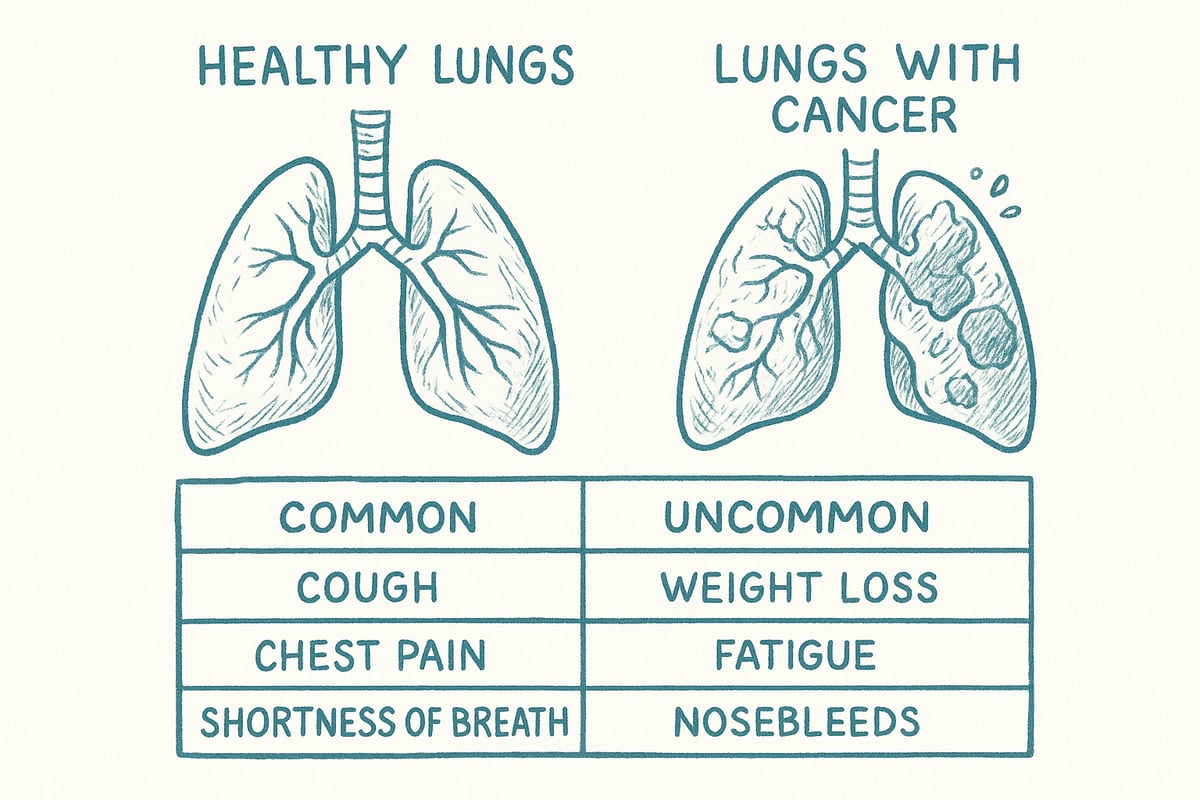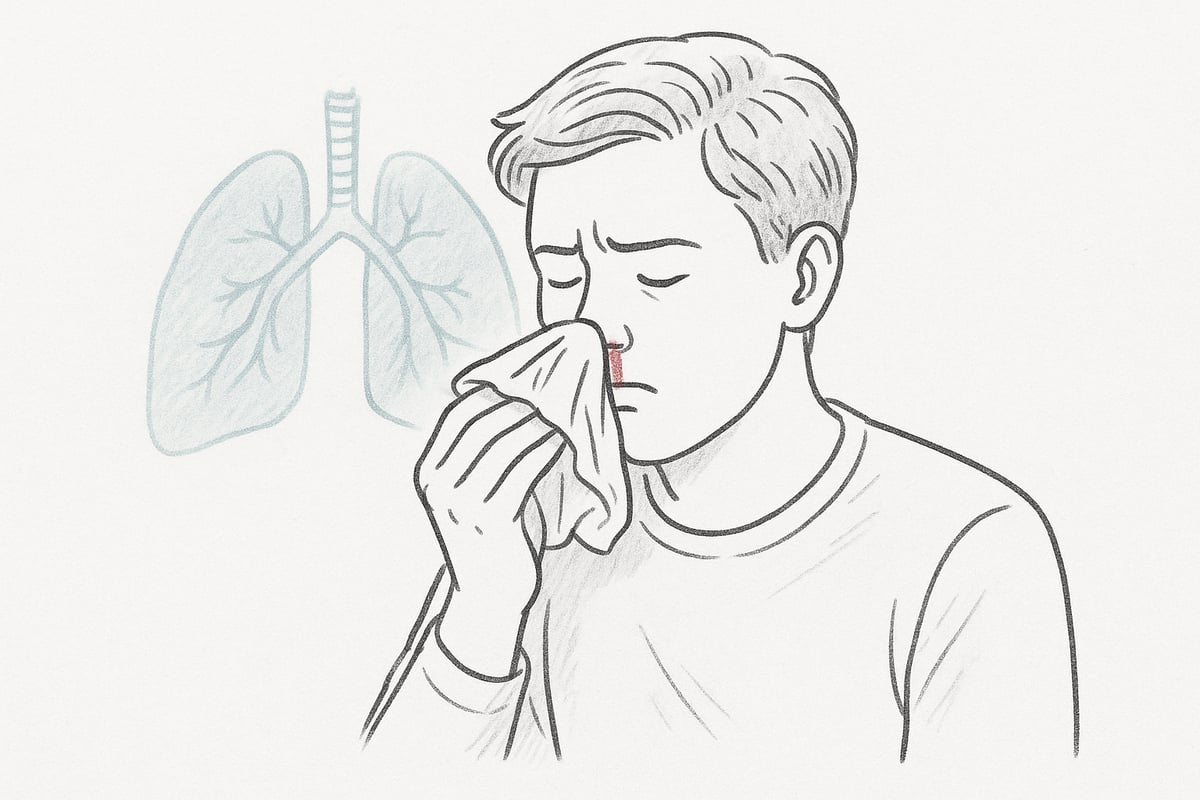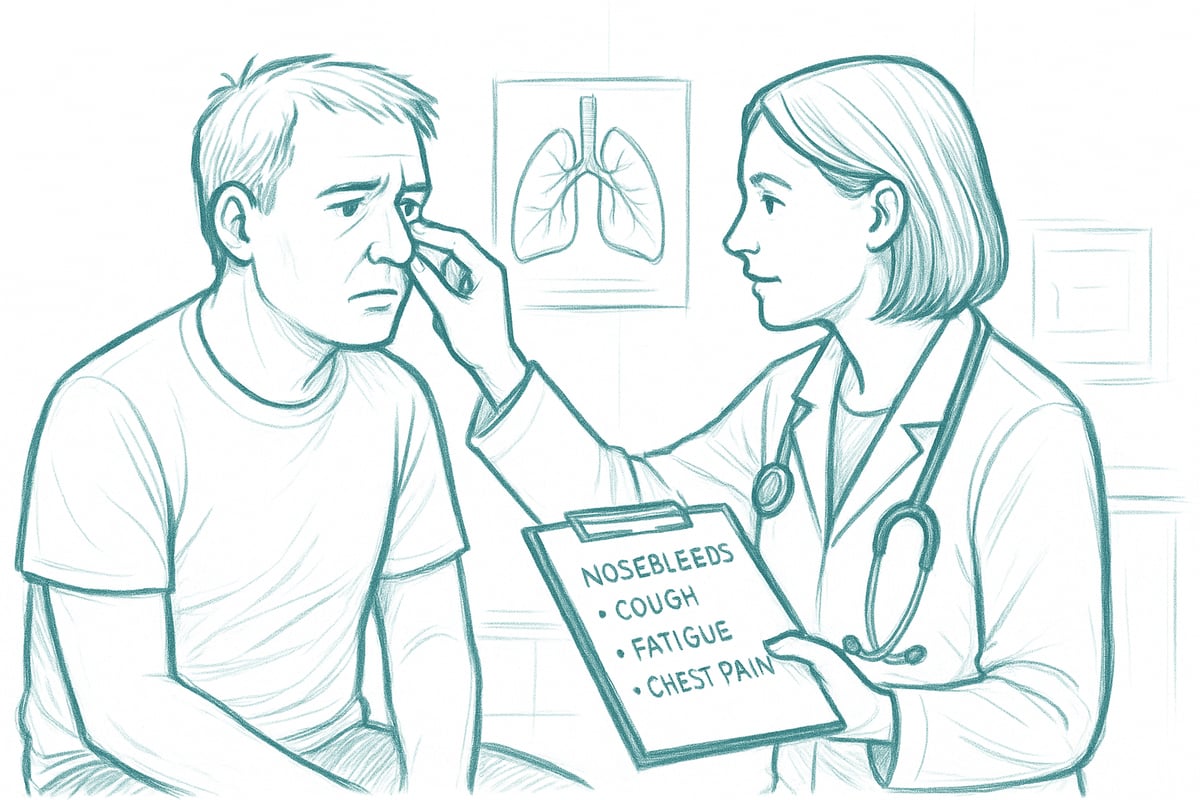Discover how nose bleeds lung cancer are linked Get clear facts on causes symptoms diagnosis and treatment in this essential 2025 guide for your health
Did you know that something as ordinary as a nosebleed might be connected to a much more serious condition? Many people are surprised to discover that there can be a link between nose bleeds lung cancer, making it important to pay attention to even minor changes in your health.
This guide is here to help you understand why nosebleeds could be more than just a nuisance. We will explore the causes, symptoms, diagnosis, and treatment options, so you know when to seek medical advice.
By learning about this unexpected connection, you can take proactive steps to protect yourself and those you care about.
Nosebleeds are a common experience, but they can sometimes signal something more serious. Understanding their causes, types, and when to worry is essential, especially for those interested in the connection between nose bleeds lung cancer and overall health.

Nosebleeds, also known as epistaxis, occur when blood vessels in the nose break and bleed. They are incredibly common, affecting about 60% of people at some point in their lives. Most nosebleeds are not linked to serious health issues.
The main causes include:
There are two main types of nosebleeds:
| Type | Location | Frequency |
|---|---|---|
| Anterior | Front of the nose | Most common |
| Posterior | Back of the nose | Less common |
Most nosebleeds can be managed at home by pinching the nostrils and leaning forward. According to NHS data, only a small percentage require medical attention. If you are monitoring nose bleeds lung cancer risk, knowing these basics is the first step.
While nosebleeds are usually harmless, some warning signs suggest a deeper issue. Frequent nosebleeds, especially if they are hard to stop or come with other symptoms, should be taken seriously.
Red flags include:
Keeping a diary of your symptoms can help your doctor spot patterns. In some cases, persistent nosebleeds have led doctors to discover blood disorders or even cancers. If you notice your nose bleeds lung cancer risk factors, such as a history of smoking or unexplained weight loss, it is even more important to seek advice.
Some blood disorders and cancers can cause nosebleeds. Lung cancer, in particular, can sometimes show up with bleeding symptoms. This happens because certain tumours affect blood clotting or invade blood vessels, making bleeding more likely.
Recent studies show that a small percentage of lung cancer patients experience nosebleeds before other symptoms appear. Early detection is crucial, as it can lead to better outcomes. If you want to learn more about how nose bleeds lung cancer are connected, visit the Lung cancer guides and resources for further information. Recognising these links helps people and their carers understand when to seek prompt medical advice.
Lung cancer is one of the most serious health concerns worldwide. It often develops silently, making it crucial for everyone to understand its basics, symptoms, and when to seek help. By learning about nose bleeds lung cancer and its signs, you can take important steps toward early detection and better outcomes.

Lung cancer is a disease where abnormal cells grow uncontrollably in the lungs. There are two main types: non-small cell lung cancer (NSCLC), which is the most common, and small cell lung cancer (SCLC), which spreads more quickly. In the UK, lung cancer is the third most common cancer, with thousands of new cases diagnosed each year.
Major risk factors include smoking, exposure to secondhand smoke, air pollution, and a family history of cancer. While survival rates are slowly improving, early detection remains key. According to Cancer Research UK, the five-year survival rate increases significantly when lung cancer is found early. Understanding the link between nose bleeds lung cancer and these risk factors can help people recognise their own risk.
The most recognised symptoms of lung cancer include a persistent cough, chest pain, breathlessness, and coughing up blood. However, there are less common signs that people often overlook, such as unexplained weight loss, fatigue, and nosebleeds. Some patients also notice clubbing of the fingers or changes in their voice.
Symptoms can vary greatly depending on the type and stage of the cancer. For example, nose bleeds lung cancer is not the most typical presentation, but it can occur, especially if the cancer affects blood vessels or causes clotting problems. For a detailed list of symptoms, you can refer to the Lung cancer symptoms and causes guide. Patient stories often highlight how subtle symptoms, including nosebleeds, led to further investigation and early diagnosis.
It is important to see your GP if you experience persistent or unexplained symptoms, especially those linked to nose bleeds lung cancer. The NHS advises that anyone with ongoing nosebleeds, unexplained bleeding, or symptoms like a chronic cough should seek medical advice.
Prepare for your appointment by noting when your symptoms started, how often they occur, and any changes over time. Early diagnosis can greatly improve your chances of successful treatment. Delaying a visit to your doctor may impact your prognosis, so always listen to your body and act promptly if something feels wrong.
Noticing a nosebleed can be unsettling, but when it occurs alongside other changes, it might be a clue to something deeper. Understanding how nose bleeds lung cancer are connected can help you identify when to seek medical advice and what to expect if this symptom appears.

Lung cancer can affect more than just the lungs. When a tumour grows, it can release chemicals that disrupt how your blood clots. This means people with lung cancer might develop bleeding issues, including nosebleeds.
Sometimes, cancer cells spread to blood vessels, making them fragile and more likely to bleed. Some tumours also cause paraneoplastic syndromes, where the immune system or hormones react to cancer and interfere with clotting factors.
Recent studies have found that patients with certain types of lung cancer are more prone to blood clotting problems. Oncologists note that these changes can make nose bleeds lung cancer a surprising but important symptom to watch for.
Medical research has shown a clear, though uncommon, link between nosebleeds and lung cancer. In some case studies, a nosebleed was the first warning sign that led patients to get further tests.
For example, in one review, a small percentage of lung cancer patients reported nosebleeds before other symptoms appeared. These cases often involved tumours that affected blood clotting or spread to the nasal passages.
While the connection is rare, it is well documented in the literature. For more details about how bleeding symptoms can appear in different lung cancer types, see the Non-small cell lung cancer information page. Always remember, a holistic look at all your symptoms is key to accurate diagnosis.
It is important to remember that nose bleeds lung cancer is just one possible explanation. Nosebleeds can also be caused by other cancers, such as leukaemia, or blood disorders like haemophilia.
Medication side effects, especially from blood thinners, can lead to frequent nosebleeds. Environmental factors, such as dry air or exposure to irritants, are also common culprits.
Doctors use a process called differential diagnosis to rule out these other causes before considering nose bleeds lung cancer as the underlying reason. They will ask about your medical history, recent injuries, and any new medications to ensure all possibilities are explored.
Experiencing nosebleeds can be unsettling, especially when you're worried about more serious conditions. Understanding the diagnostic process is crucial if you or a loved one are concerned about the possible link between nose bleeds lung cancer. Let's break down each step, so you know what to expect and how to prepare.

When you visit your GP with repeated nose bleeds lung cancer might not be the first thing on your mind, but your doctor will look at the bigger picture. They will start by asking about your symptoms in detail. Expect questions about the frequency and duration of nosebleeds, any recent injuries, and whether you’ve noticed other changes like coughing, chest pain, or weight loss.
Your GP will perform a physical examination, checking your blood pressure and assessing your overall health. They may look inside your nose for signs of infection or injury. If the pattern of nose bleeds lung cancer symptoms, or other warning signs are present, your GP will arrange further tests or refer you to a specialist for more in-depth evaluation.
If your symptoms raise concerns about nose bleeds lung cancer, your doctor will order specific investigations. Blood tests, such as a full blood count and clotting profile, help detect any underlying blood disorders or issues with clotting. Imaging studies are also important. You may be sent for a chest X-ray, and sometimes a CT scan or MRI, to look for abnormalities in the lungs or surrounding areas.
In some cases, a nasal endoscopy is performed to examine the inside of your nose and throat. If a suspicious area is found, a small tissue sample (biopsy) might be taken for further analysis. Lung function tests can also provide valuable information about how well your lungs are working. The diagnostic pathway aims to rule out other causes before confirming any diagnosis.
Awaiting results after tests for nose bleeds lung cancer can be an emotionally draining time. It's normal to feel anxious or overwhelmed by uncertainty. Reaching out to support resources can make a big difference. Many patients and families benefit from talking to counsellors, joining support groups, or simply sharing their worries with trusted friends.
If you're looking for guidance on managing the emotional side of symptoms and diagnosis, the Cancer health and wellbeing guide offers practical advice and tips. Remember, keeping an open dialogue with your healthcare team and staying informed can help you feel more in control during this challenging period.
Facing a diagnosis of nose bleeds lung cancer can be overwhelming, but understanding your treatment options and how to manage symptoms like nosebleeds can make a significant difference. Effective care involves a blend of medical treatments, symptom management, and support for your overall wellbeing.
Treatment for nose bleeds lung cancer is tailored to the individual, taking into account the cancer type, stage, and your general health. The main options include surgery, chemotherapy, radiotherapy, and immunotherapy. Each comes with its own set of benefits and possible side effects, which may include bleeding or increased risk of nosebleeds.
Here’s a table summarising the key treatments and their typical side effects:
| Treatment | Purpose | Common Side Effects |
|---|---|---|
| Surgery | Remove tumour | Pain, bleeding |
| Chemotherapy | Kill cancer cells | Fatigue, bleeding risks |
| Radiotherapy | Target cancer area | Skin changes, nosebleeds |
| Immunotherapy | Boost immune response | Fatigue, inflammation |
Your oncologist will discuss the best approach for your situation. According to NHS protocols, the choice of treatment is based on balancing effectiveness with quality of life. Managing side effects is crucial, especially if you experience nosebleeds or other bleeding symptoms during your nose bleeds lung cancer journey.
Nosebleeds can be distressing, especially when they occur alongside cancer treatment. If you have nose bleeds lung cancer, you may need to adjust medications like anticoagulants under medical supervision. Oncologists often recommend practical steps such as using a humidifier, applying nasal creams, and avoiding nose-picking to help prevent bleeding.
If a nosebleed is heavy, lasts longer than 20 minutes, or is accompanied by dizziness or weakness, seek emergency care immediately. It's also wise to keep your healthcare team informed about any changes. For more practical strategies, you can explore Tips for people with cancer, which offers guidance on managing challenging symptoms like nosebleeds. Remember, quick action can prevent complications and help you stay safe during treatment.
Supportive and palliative care teams play a vital role in the nose bleeds lung cancer journey, focusing on symptom control and emotional wellbeing. Psychological support, access to counselling, and peer support groups can greatly improve your quality of life. Many patients report feeling more empowered and less isolated with a strong support network.
Holistic care means addressing not just the physical symptoms but also the emotional and social challenges you may face. Open communication with your healthcare team ensures that your needs and preferences are respected throughout treatment, helping you maintain the best possible quality of life.
Taking steps to protect your health is essential, especially when considering the risks linked to nose bleeds lung cancer. Prevention, monitoring, and staying informed can empower you to live well, even if you are concerned about symptoms or at higher risk.
Preventing lung cancer starts with reducing exposure to risk factors. The most effective step is quitting smoking and avoiding secondhand smoke. Limiting your exposure to air pollution and harmful workplace chemicals is also crucial. Maintaining a healthy diet, regular exercise, and attending routine health check-ups further lowers your risk.
Public health campaigns across the UK provide resources and support for those aiming to prevent nose bleeds lung cancer. Simple changes, like using air purifiers or following workplace safety guidelines, can make a significant difference. Staying proactive about prevention keeps you one step ahead.
If you experience symptoms such as nose bleeds lung cancer, it is important to monitor your health closely. Keeping a symptom diary helps track any changes, including frequency and severity of nosebleeds. Attend all scheduled follow-up appointments and communicate any new or worsening symptoms to your healthcare team.
Knowing when to seek medical advice is vital. For guidance on recognising serious symptoms and understanding when it is time to consult your doctor, the When to call your doctor resource provides helpful information. Early intervention can make a significant difference in outcomes.
Staying informed about nose bleeds lung cancer helps you take control of your health journey. Access reputable resources, connect with support groups, and reach out to charities for guidance. Building a support network can help you feel less isolated and more confident when making health decisions.
Participating in awareness initiatives, such as November is Lung Cancer Awareness Month, is a great way to stay updated on the latest developments and resources. Remember, advocating for your health starts with knowledge and community support.
As we’ve explored, understanding the link between nosebleeds and lung cancer can make a real difference for your health and peace of mind. Whether you’re managing symptoms, supporting a loved one, or simply wanting to stay informed, having access to reliable resources and practical support really matters. At Cancer Care Parcel, we’re here to make sure no one feels alone or left in the dark when facing cancer. If you’d like to empower yourself further with trusted guidance and compassionate help, Donate to support our mission—together, we can ensure everyone gets the care and information they deserve.

In a world full of conflicting and sometimes misleading information about cancer, Cancer Care Parcel stands out by offering resources backed by solid facts. Funded entirely by the sale of our products and donations, we ensure that every resource on our site is accurate, trustworthy, and focused on supporting the cancer community.
Founded by Dr Shara B.A. Cohen, PhD, CBiol, FWIF, FRCPath, FIBMS, FRSB, BEM, Cancer Care Parcel provides trusted information, a freebies directory, and a library of live and on-demand webinars for patients, families, and caregivers. The organisation also gives away free care packages to those in need, made possible through the generosity of donors and supporters. Every purchase or contribution helps us deliver comfort, education, and a sense of calm to people affected by cancer.
Cancer Care Parcel Needs Your Support To Continue Providing Free Care Packages, Trusted Resources, And Webinars For Cancer Patients. Brexit And US Sanctions Have Severely Impacted Our Funding, And We Urgently Need Donations To Keep These Essential Services Running. Join Us In Ensuring No One Faces Cancer Alone.
It’s probably one of the worst things for someone to be told: “You have cancer,”
When facing a cancer diagnosis, patients often encounter an overwhelming number of tests, procedures, and medical terms. Among these, laboratory tests play a central role in understanding the disease, planning […]